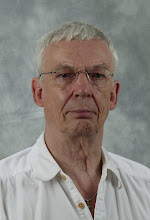The reduction of reality to that which can be quantified and the subsequent exclusion of all that can’t are touted as science. In truth, it is scientism, an ideological doctrine that denies existence to all that can’t be quantified.
It is the ideology of the technician who posits that what is, is, and can be no other, and what is, is, and can neither change nor evolve, but, if it does so, it changes along lines that can be quantified and predicted, even though the predictions are often wrong.
Quantification is an attempt to impose a linear matrix on a reality that is essentially nonlinear and contradictory. Linear quantification is a chain forged of numbers and formulae that encourages what Samuel Beckett called that great deadener, habit.
We are told that today’s globalized world calls for creativity, and by creativity we mean adding another link to the chain. When our leaders speak of thinking outside the box, what they mean is stepping out of it long enough to slap on a new coat of paint before climbing back in, convinced it's a new box.
We are a nation of technicians, which is another way of saying we are a nation of intellectual cripples. It’s reflected in our language: one word, one meaning to the exclusion of metaphor, nuance and allusion. We are told as children to say what we mean, to not beat around the bush and to get to the point. For the religious, this means that the Bible is stripped of its poetry and becomes nothing more than a technical manual that instructs us how to live our lives, down to the letter.
Numbers deaden our moral sensibilities. The stench of poverty is buried deep within charts and graphs; we print our spreadsheets on thick paper so the blood of the innocent can’t seep through; numbers proudly proclaim an added point of corporate profit while directing our attention away from the misery created as this point of profit was achieved. And we insist that our language be as value free as our numers.
Quantification is the bastard child of the rational. We are so enthralled by it that we are blinded to the fact that rational is of limited value for it can only allude to reality using words or numbers, but can never capture reality's totality.
Buddhists speak of a finger pointing to the moon and of the error of concentrating on the finger and not the moon. Technicians quibble over the finger, poets and madmen admire the moon.
Poetry occupies the realm of the transrational, that world that rises above the rational and the emotional. It is the world of metaphor and allusion that gives us an intuitive feel for the real that the rational denies us. All great conceptual breakthroughs, even the scientific ones, have resulted from transrational insights. Scientific experimentation works best when it prepares the mind for the “Aha!” moment.
The problem with any earth-shaking cultural breakthrough is that it attracts disciples and followers who proceed to corrupt it by trying to explain it in greater detail.
Christianity is a prime example of this. St. Paul was given the mission of destroying Christianity, and he succeeded by reducing Jesus’ teaching to a matter of personal salvation.
Jesus didn’t die for our sins. He died for preaching a gospel of God’s justice on earth that has been anathema to oligarchs and plutocrats throughout the centuries.
The tragedy of quantification is that whatever can be quantified can be commodified, and if our only reality is quantification, then all of existence becomes a commodity and the beauty is stripped from it. A technician not only ignores the forest for the trees, but he ignores the trees, for board feet of lumber. And if it’s more cost effective to clear cut, he does so.
The quantified life is an empty life, but thank goodness it allows us to count our pills and measure out our booze.
Sunday, August 16, 2009
Subscribe to:
Post Comments (Atom)


No comments:
Post a Comment